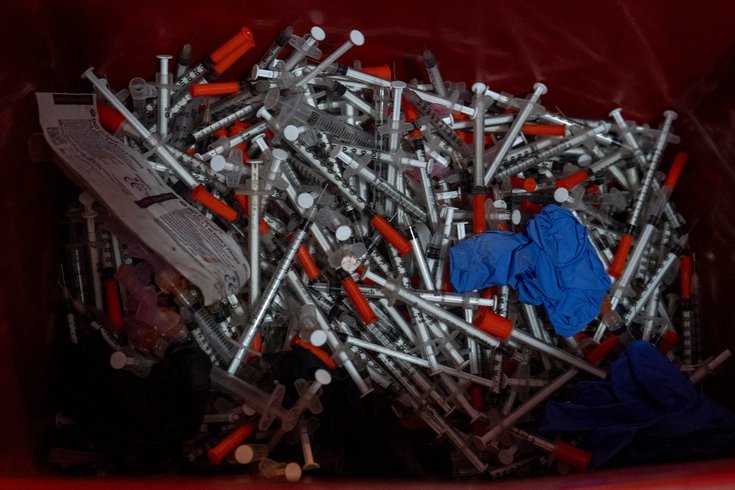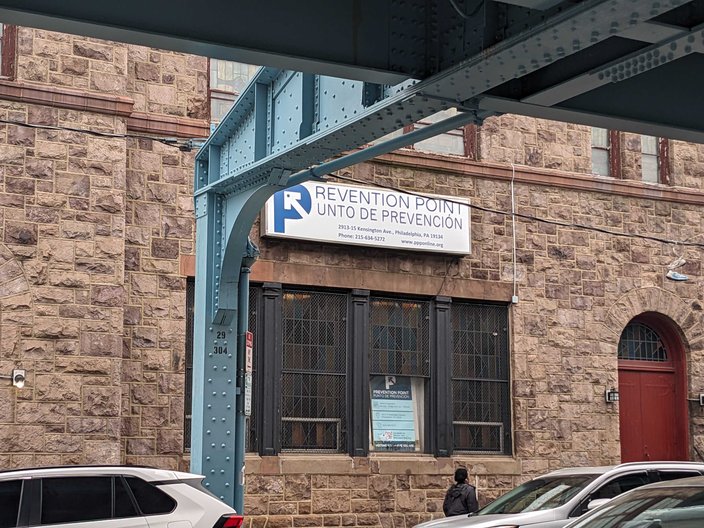
April 18, 2024
 DANIELLA HEMINGHAUS/USA TODAY NETWORK
DANIELLA HEMINGHAUS/USA TODAY NETWORK
Philly Mayor Cherelle Parker plans to strip funding to syringe exchange programs despite research showing they reduce HIV/AIDS and hepatitis infections among drug users. Above, used needle collected by the harm reduction group Savage Sisters in Kensington in 2023.
AIDS was the leading cause of death in young men in the U.S. when Prevention Point Philadelphia started in 1992. Nearly 33,600 Americans died from HIV infection that year, and about one-third of all AIDS cases have been linked to injection drug use since the beginning of the epidemic.
"If you go back to the '80s and '90s, death (from HIV) was everywhere," said attorney Scott Burris, who negotiated the first contract between the city and Prevention Point, the largest needle exchange program in the city and one of the largest in the country. "It was a central fact of living in a place like Philadelphia."
At the time, state drug paraphernalia laws criminalized the distribution of syringes. But these laws were "clearly aimed at people … selling drug paraphernalia for profit, and that didn't apply to syringe exchange," said Burris, a professor in Temple University's law and public health schools.
He argued the city had the general authority to protect public health and that using needle exchange programs to help prevent the spread of blood-borne diseases was doing just that – and was therefore not in violation of paraphernalia laws. Despite threats from state and federal officials, Mayor Ed Rendell declared HIV/AIDS a public health emergency and issued an executive order authorizing Prevention Point Philadelphia to open in 1992.
Since then, Prevention Point has helped stem the spread of HIV, saving the city millions of dollars by averting new HIV diagnoses, based on the lifetime cost of treatment for people with HIV, according to research. Many studies have shown that needle exchange programs reduce HIV and hepatitis C infections among people who inject drugs, nationally and worldwide.
Now, Mayor Cherelle L. Parker's administration has decided not to spend city dollars on syringe exchange services and plans to cut funds to Prevention Point by about $900,000. That has public health experts and the people who helped start needle exchange programs in the city reflecting on the impact these services have had – and predicting dire ramifications.
In her first budget address to City Council, Parker said "not one city dollar" would go to syringe exchange programs, saying the Philadelphia government can't afford to appropriate any funds to these services. Parker has said philanthropies, businesses or other sources should pay for needle exchange programs in the city.
After this story was initially published, the Parker administration responded to a request for comment by noting its plans to invest $100 million into a comprehensive system of long-term care, treatment and housing for people struggling with addiction, mental health challenges and homelessness.
"That complex, innovative and comprehensive work is well underway, led by the Managing Directors Office," spokesperson Joe Grace said. "That is the focus of our efforts, not only for Kensington, but for other neighborhoods and communities across Philadelphia as well. As Mayor Parker has said repeatedly, the status quo is unacceptable."
A contingent of City Council members has recently been pushing back in general on harm reduction, a public health approach based on engaging people in addiction without judgment and offering lifesaving tools and information. Councilmember Quetcy Lozada has said harm reduction organizations "need to be respectful and conscious neighbors to the other businesses and people who call Kensington home."
Prevention Point Philadelphia is losing city funds for its needle exchange program, putting Philadelphia at increased risk for new HIV infections, health experts say.
Kensington, where Prevention Point operates out of a former church, is one of the largest open-air drug markets on the East Coast.
Burris and others who work in public health said cracking down on harm reduction and needle exchange services will lead to more drug overdoses and fatalities and a spike in HIV infections.
"When you prevent new HIV diagnoses" with the help of needle exchange, "... you also prevent all of the costs related to treating … (those) infections, as well as all of the other costs in terms of health care utilization and comorbidities that come with HIV," said Ayden Scheim, an epidemiologist at Drexel University. "And that's just HIV. That's not even considering the other health risks related to it."
Research shows syringe exchanges helped prevent more than 10,500 HIV diagnoses tied to injection drug use in Philadelphia between 1993 and 2002 and nearly 2,000 in Baltimore from 1995 to 2004. According to the study, Philadelphia saved $243.4 million each year based on the averted HIV diagnoses and the lifetime cost – $229,800 – of treating a person with HIV. Baltimore saved $62.4 million annually.
A report from the Philadelphia Department of Public Health that looked at people diagnosed with HIV from Dec. 31, 2019, through June 30, 2020, stated that 18,798 city residents were living with diagnosed HIV at the time, with 439 people newly diagnosed in 2019. The report said the city planned to prevent the spread of HIV by, among other techniques, "promoting pre-exposure prophylaxis (PrEP) and syringe services."
Philadelphia saw a record 1,413 drug overdose deaths in 2022, partly driven by the increased presence of the synthetic opioid fentanyl in the local drug supply, according to the city's department of public health. Nationwide, deaths from drug overdoses reached an all-time high of 112,000 for a 12-month period in 2023, statistics from the U.S. Centers for Disease Control and Prevention show.
Fentanyl is 50 times stronger than heroin. It also has a shorter half-life than heroin, so users have to inject more frequently to stave off the intense symptoms of withdrawal, making "distributing syringes more important than ever," said Alexis Roth, an associate professor of community health and prevention at Drexel. "Common sense would say we need more syringes in our community, not less."
Scheim, who was involved in implementing the first needle exchange in the West African nation of Sierra Leone, said: "At no point did I have to argue with government officials about whether or not this was a worthy strategy, because they trusted the World Health Organization, the United Nations program, and as the Centers for Disease Control, and every other effort organization in the world that said the needle and syringe programs are the fundamental approach to prevent HIV among people who inject drugs."
Jose DeMarco, a longtime community organizer and leader of Act Up Philadelphia, was one of the people who helped Prevention Point get off the ground.
"I lost so many of my friends" to HIV, DeMarco said. "I lost partners. It was a nightmare of death and sickness."
DeMarco recalled how starting Prevention Point was a "group effort." Active drug users ran the needle exchange, and sometimes neighbors would come and overturn the tables, DeMarco said. But they pushed on, even with mobile syringe exchange services around the city in the early years, DeMarco said.
"I do remember that big, old, ugly van we would use" for outreach, DeMarco recalled with a laugh. "I remember bouncing around in the back of that horrible truck."
Through the years, Prevention Point has expanded its services beyond needle exchange. The organization provides HIV testing and primary care, case management and medication for opioid use disorder, wound care, overdose prevention and reversal training, housing and other services, as well as linking people to outside addiction and medical treatment.
"What I remember most is how much the services were needed back then, and it makes me know how much in 2024 – how much they're desperately needed now," DeMarco said, specifically referring to Prevention Point's needle exchange.
Burris predicted that cutting funding for Prevention Point's syringe exchange and for other organizations that offer needle exchange services throughout Philadelphia would be a "catastrophe," a "self-inflicted wound on the city.
"If I were to say one thing to Mayor Parker, I would say, 'You're not actually thinking about your legacy," Burris said. "'Because no matter what you accomplish … if you unleash an HIV epidemic, that's probably one of the main things you'll be remembered for.'"
 Michaela Althouse/PhillyVoice
Michaela Althouse/PhillyVoice